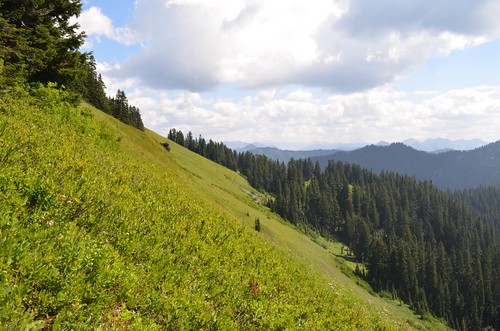Last fall I started developing a severe pain in my left knee, particularly when walking down hills. I could limp through it, but even a mild incline provoked incredible pain. I finally decided to go see a physical therapist in December. Fairly quickly the pain in my knee went away, but it just moved up to my hip and back. This wasn’t any better than the initial issue that brought me in, so I fired that physical therapist and went to another one.
This new physical therapist has a very approach than the two others I’ve worked with. The foundation of her work is based on what she calls “ring correction” which has to do with how the ribs poke out (this is my horrible lay person’s understanding). So when I first started working with her, she didn’t have me do anything with my left knee. Instead, we started work on my right foot.
It’s been an incredibly slow and subtle process. If I didn’t have over 16 years of practice paying deep attention to my body, I don’t know how I would make any progress in this method. It requires a lot of trust (in the physical therapist and myself) and patience.
On Friday my PT was massaging a very tender and sensitive part of my armpit. I joked about being so sensitive. She paused and said, “You’re sensitive, but you’re also tough.” This led to her asking me about my experience at Amazon and how I recovered from that.
I told her that I have tremendous sitzfleisch which means I can literally sit and tolerate a lot of crap. But at a certain point, if there is no purpose, even I will give up. So to her point about me being sensitive but tough, if the pain/discomfort leads to something better, I can tolerate it.
We talked about resilience, and I told her I spent a lot of time thinking about resilience. I’m pretty sure I made that word my theme a few years ago. At any rate, in my investigations about resilience, here is what I want to say about developing and cultivating resilience in self. First, make sure you are getting enough food and rest. I know when I’m tired and/or hungry I’m much more brittle. Second, having a support network is vital. Third, take risks!
When I was working with my therapist, once I had regained a certain level of stability/feeling of safety, it was time for me to move back into the world. But I was terrified of fucking everything up. I thought any level of failure would mean DOOOOM. I started by taking small risks. And in order to make it easier to try things, I decided to make this my measure for success: did anyone die?
Risk-taking builds up resilience, is what I’m trying to say. BUT, these risks have to be in things that matter to you. If the risks don’t connect to a larger purpose, well, I’m not sure what happens, to be honest. I think that falls under just faffing about. It can be useful in that I can prove to myself that I can take a risk, but if there is nothing at stake, what kind of risk is it?
So, in the last four years I’ve been practicing taking risks. At first tiny ones with low stakes. As I developed my risk/resilience muscle, I’ve been taking more risks. My therapist told me that happy people take more risks. Is it because they are happy that they take more risks, or it that taking more risks makes them happy? All I know from my experiment the last few years is that in taking risks I’ve become an active participant in my life again, instead of passively waiting for things to happen.
I’m curious to hear from folks about their experience around resilience. What increases yours? And what risks are you taking toward your own goals?


